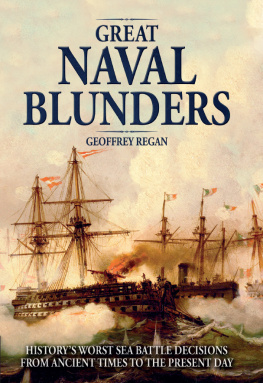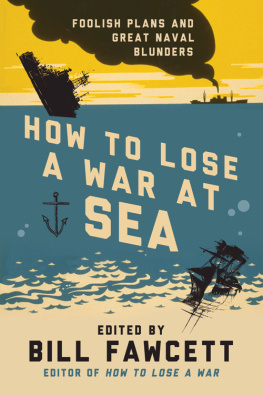Geoffrey - Great Naval Blunders
Here you can read online Geoffrey - Great Naval Blunders full text of the book (entire story) in english for free. Download pdf and epub, get meaning, cover and reviews about this ebook. year: 2012, publisher: Carlton Books Ltd, genre: History. Description of the work, (preface) as well as reviews are available. Best literature library LitArk.com created for fans of good reading and offers a wide selection of genres:
Romance novel
Science fiction
Adventure
Detective
Science
History
Home and family
Prose
Art
Politics
Computer
Non-fiction
Religion
Business
Children
Humor
Choose a favorite category and find really read worthwhile books. Enjoy immersion in the world of imagination, feel the emotions of the characters or learn something new for yourself, make an fascinating discovery.
Great Naval Blunders: summary, description and annotation
We offer to read an annotation, description, summary or preface (depends on what the author of the book "Great Naval Blunders" wrote himself). If you haven't found the necessary information about the book — write in the comments, we will try to find it.
Great Naval Blunders — read online for free the complete book (whole text) full work
Below is the text of the book, divided by pages. System saving the place of the last page read, allows you to conveniently read the book "Great Naval Blunders" online for free, without having to search again every time where you left off. Put a bookmark, and you can go to the page where you finished reading at any time.
Font size:
Interval:
Bookmark:

For David Coltman
This is an Andr Deutsch book
This edition is published in 2012 by Andr Deutsch
an imprint of the Carlton Publishing Group
20 Mortimer Street
London
W1T 3JW
First published 1993,
Reprinted 1994 (three times), 1995 (twice), 1996
Copyright Geoffrey Regan 1993, 2012
All rights reserved. No part of this publication may be reproduced, stored in a retrieval system or transmitted in any form or by any means, electronic, mechanical, photocopying, recording or otherwise, without the prior permission of the publishers and copyright holder.
ISBN 978 0 233 00350 4
eISBN 978 1 780 12050 8
A catalogue record for this book is available from the British Library
Printed and bound in Great Britain by Mackays
Picture Acknowledgements
The Publishers wish to thank the following for permission to reproduce pictures in this book: Archiv fr Kunst und Geschichte; Image Select; Imperial War Museum; Mary Evans Picture Library; National Maritime Museum; Peter Newarks Military Pictures; Popperfoto.

CONTENTS
INTRODUCTION
Naval blunders generally have a finality that is not achieved on land. The captain who drives his ship onto rocks or into collision with other vessels is clearly to blame for the damage or loss that ensues. The fact that the elements in the shape of storms or fogs have made his task almost impossible, is rarely enough to save him from court-martial and disgrace. If he is a popular commander like Sir Clowdesley Shovell and has the wit to go down with his ship, as Shovel did in the Association, wrecked in the Scilly Isles the public may overlook his errors and cloud them in a romantic aura of hopeless struggle against a relentless Nature and worthy self-sacrifice. If, however, like Sir Hovenden Walker at Louisburg in 1711, the victim is unpopular and returns like a half-drownd rat to tell the tale then neither their lordships of the Admiralty nor the great British public are likely to be merciful.
The history of war at sea is full of personal disasters, suffered by individual captains or admirals, and I have attempted to give this aspect of the subject a full coverage in this book. Peopling its pages are 19th-century eccentrics like Pompo Heneage and Prothero the Bad, the redoubtable Lord Belly-Cloth and the crazy French admiral Pierre, in whom was little harm and even less ability. There are also naval villains like Sir John Byng, who failed to relieve Minorca; Sir Ernest Troubridge, who failed to intercept the German battlecruiser Goeben; Admiral Persano, who allowed himself to be surprised and defeated at Lissa; and Vice-Admiral Richard Lestock, who refused to come to the aid of Admiral Matthews at Toulon in 1744. Cowards surprisingly have always found it easier to find somewhere to hide at sea than on land. In the days of sail, Benbows villainous captains simply had to fight shy of the action rather than literally run away. Others, like Admiral Albini at Lissa, had only to misunderstand or misinterpret orders. In the book there are bunglers too, like Ralph Seymour, whose signals robbed Admiral Beatty of victory at the battle of the Dogger Bank in 1915, and Admiral Plumridge who spent much of his time, like some latter-day Viking, destroying British property by mistake.
Yet personal or individual failure at sea were often merely reflections of the inefficiency of the Admiralty, which sent fleets into action undermanned, underfed, armed with inadequate weapons, on wild-goose-chases or even suicide missions. In such cases the commanders and their men were victims of bureaucratic muddle or political interference. Sometimes the wrong man was appointed for the job like Admiral Price at Petropavlovsk, Tom Phillips at Singapore or the pugnacious Codrington at Navarino. Sometimes the wrong ship was selected for the task the choice of the Hood to face the Bismarck has to be the worst error of this kind. Most ridiculous of all, sometimes the wrong task is set for the ships available. In this category Duckworths struggle through the Dardanelles in 1807 was only a forerunner of the much more disastrous operation in 1915, which still failed to convince naval opinion that ships come out second best when fighting forts. Sometimes the price of Admiralty was no more than a Gilbertian farce like Operation Menace sent to Dakar in 1940 but more often it was tragic, like the scattering of Convoy PQ17, the failure to rescue the crew of the stricken Indianapolis or the squandering of many young lives in the Aboukir, Hogue and Cressy on the Broad Fourteens in 1914. Nor have Admiralty designers been free from responsibility for naval disasters. Faulty ship design comical in the French battleship Hoche and the Russian circular ironclads was tragic in the British battlecruisers sent into action at Jutland in 1916 as little more than floating coffins.
Life at sea has never been easy; a life on the ocean wave was not for the weak or the squeamish. Yet much of the suffering was unnecessary and imposed by ignorant and sadistic tyrants. As on land, disease was always a bigger killer than enemy action. Yet little effort was made to improve living conditions, quality of food or shore leave. Venereal disease, scurvy, yellow fever and typhus were the scourge of sailors well into the 19th century. Even though it was well known that to maintain fleets for any length of time in the Caribbean was little less than a death sentence for their crews, Britain continued to squander thousands of lives there both at sea and ashore during the 17th and 18th centuries. Admiral Hosiers grim story speaks volumes for the ignorance of the Admiralty administrators. Nor can the famous and triumphant circumnavigation by Anson remain gilt-edged in history books, when its cost in human suffering is set in the balance. Those sailors who did not die from disease or the appalling food and rum, suffered such ill-treatment at the hands of officers responsible for maintaining discipline in the Royal Navy that it would have made Oriental potentates no strangers themselves to brutality sick in the stomach. Britain cradle of democracy and parliamentary government continued to treat its sailors worse than Brazilian slave owners or Arab slave traders treated their victims, well into the 19th century. In the War of 1812 between Britain and the United States, it is ironic to note how many British sailors deserted His Majestys ships to serve in the navy of the new United States of America, where conditions were fairer. And it was these men who provided the stiffening that enabled American crews to beat their British opponents on so many occasions. Such men did not see themselves as traitors so much as liberated slaves, unwilling to labour under the lash.
In the 20th century the submarine and the development of naval air power produced a revolution in naval warfare. In both world wars Britains failure to come to terms with the threat from beneath the waves brought her close to defeat. Yet though the opponents of the submarine blundered by failing to appreciate its threat, all did not go smoothly for the submariners. Sometimes it was the fault of the submarine as in the case of the incredible British K ships and sometimes it was their weaponry, as with the appallingly inefficient German torpedoes in 1939 and 1940. Properly equipped, the U-boats might have crippled the British capacity to continue the war after the evacuation from Dunkirk.
All ship losses are tragic yet history has recorded a number of incidents which have earned special notoriety. Sometimes the fault lay with the captain or crew as with King Henry Is White Ship or the
Next pageFont size:
Interval:
Bookmark:
Similar books «Great Naval Blunders»
Look at similar books to Great Naval Blunders. We have selected literature similar in name and meaning in the hope of providing readers with more options to find new, interesting, not yet read works.
Discussion, reviews of the book Great Naval Blunders and just readers' own opinions. Leave your comments, write what you think about the work, its meaning or the main characters. Specify what exactly you liked and what you didn't like, and why you think so.












